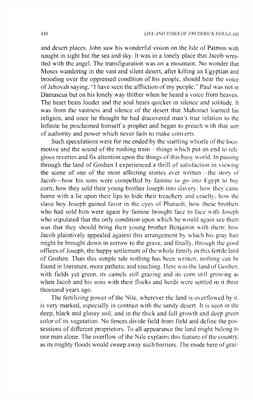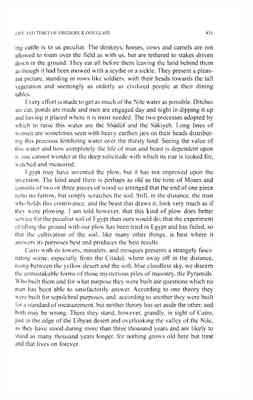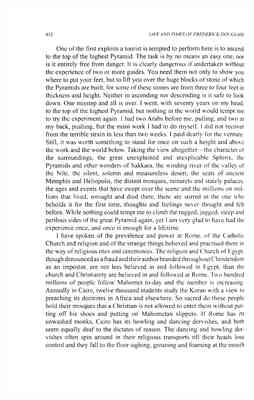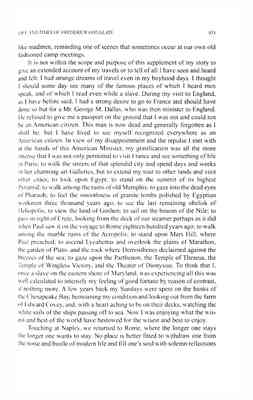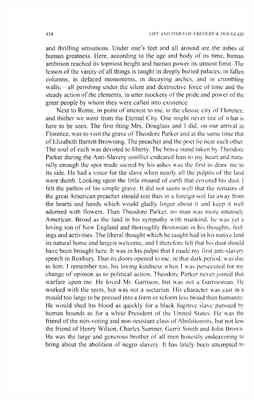Pages
56
430 LIFE AND TIMES OF FREDERICK DOUGLASS
and desert places, John saw his wonderful vision on the Isle of Patmos with naught in sight but the sea and sky. It was in a lonely place that Jacob wrestled with the angel. The transfiguration was on a mountain. No wonder that Moses wandering in the vast and silent desert, after killing an Egyptian and brooding over the oppressed condition of his people, should hear the voice of Jehovah saying, "'I have seen the affliction of my people." Paul was not in Damascus but on his lonely way thither when he heard a voice from heaven. The heart beats louder and the soul hears quicker in silence and solitude. It was from the vastness and silence of the desert that Mahomet learned his religion, and once he thought he had discovered man's true relation to the Infinite he proclaimed himself a prophet and began to preach with that sort of authority and power which never fails to make converts.
Such speculations were for me ended by the startling whistle of the locomotive and the sound of the rushing train– things which put an end to religious reveries and fix attention upon the things of this busy world. In passing through the land of Goshen I experienced a thrill of satisfaction in viewing the scene of one of the most affecting stories ever written– the story of Jacob– how his sons were compelled by famine to go into Egypt to buy corn; how they sold their young brother Joseph into slavery; how they came home with a lie upon their lips to hide their treachery and cruelty; how the slave boy Joseph gained favor in the eyes of Pharaoh; how these brothers who had sold him were again by famine brought face to face with Joseph who stipulated that the only condition upon which he would again see them was that they should bring their young brother Benjamin with them; how Jacob plaintively appealed against this arrangement by which his gray hair might be brought down in sorrow to the grave, and finally, through the good offices of Joseph, the happy settlement of the whole family in this fertile land of Goshen. Than this simple tale nothing has been written, nothing can be found in literature, more pathetic and touching. Here was the land of Goshen, with fields yet green, its camels still grazing and its corn still growing as when Jacob and his sons with their flocks and herds were settled in it three thousand years ago.
The fertilizing power of the Nile, wherever the land is overflowed by it, is very marked, especially in contrast with the sandy desert. It is seen in the deep, black and glossy soil, and in the thick and full growth and deep green color of its vegetation. No fences divide field from field and define the possessions of different proprietors. To all appearance the land might belong to one man alone. The overflow of the Nile explains this feature of the country. as its mighty floods would sweep away such barriers. The mode here of graz-
57
LIFE AND TIMES OF FREDERICK DOUGLASS 431
ing cattle is to us peculiar. The donkeys, horses, cows and camels are not allowed to roam over the field as with us, but are tethered to stakes driven down in the ground. They eat all before them leaving the land behind them as though it had been mowed with a scythe or a sickle. They present a pleasant picture, standing in rows like soldiers, with their heads towards the tall vegetation and seemingly as orderly as civilized people at their dining tables.
Every effort is made to get as much of the Nile water as possible. Ditches are cut, ponds are made and men are engaged day and night in dipping it up and having it placed where it is most needed. The two processes adopted by which to raise this water are the Shaduf and the Sakiyeh. Long lines of women are sometimes seen with heavy earthen jars on their heads distributing this precious fertilizing water over the thirsty land. Seeing the value of this water and how completely the life of man and beast is dependent upon it, one cannot wonder at the deep solicitude with which its rise is looked for, watched and measured.
Egypt may haw invented the plow, but it has not improved upon the invention. The kind used there is perhaps as old as the time of Moses and consists or two or three pieces of wood so arranged that the end of one piece turns no furrow, but simply scratches the soil. Still, in the distance, the man how holds this contrivance, and the beast that draws it, look very much as if they were plowing. I am told however, that this kind of plow does better service for the peculiar soil of Egypt than ours would do; that the experiment of tilling the ground with our plow has been tried in Egypt and has failed, so that the cultivation of the soil, like many other things, is best where it answers its purposes best and produces the best results.
Cairo with its towers, minarets, and mosques presents a strangely fascinating scene, especially from the Citadel, where away off in the distance, rising hetween the yellow desert and the soft, blue cloudless sky, we discern the unmistakahle forms or those mysterious piles of masonry, the Pyramids. Who huilt them and for what purpose they were built are questions which no man has been able to satisfactorily answer. According to one theory they were huilt for sepulchral purposes, and, according to another they were built for a standard of measurement, but neither theory has set aside the other, and both may be wrong. There they stand, however, grandly, in sight of Cairo, just in the edge of the Libyan desert and overlooking the valley of the Nile, as they have stood during more than three thousand years and are likely to stand as many thousand years longer, for nothing grows old here but time and that lives on forever.
58
432 LIFE AND TIMES OF FREDERICK DOUGLASS
One of the first exploits a tourist is tempted to perform here is to ascend to the top of the highest Pyramid. The task is by no means an easy one, nor is it entirely free from danger. It is clearly dangerous if undertaken without the experience of two or more guides. You need them not only to show you where to put your feet, but to lift you over the huge blocks of stone of which the Pyramids are built, for some of these stones are from three to four feet in thickness and height. Neither in ascending nor descending is it safe to look down. One misstep and all is over. I went, with seventy years on my head, to the top of the highest Pyramid, but nothing in the world would tempt me to try the experiment again. I had two Arabs before me, pulling, and two at my back, pushing, but the main work I had to do myself. I did not recover from the terrible strain in less than two weeks. I paid dearly for the venture. Still, it was worth something to stand for once on such a height and above the work and the world below. Taking the view altogether– the character of the surroundings, the great unexplained and inexplicable Sphinx, the Pyramids and other wonders of Sakkara, the winding river of the valley of the Nile, the silent, solemn and measureless desert, the seats of ancient Memphis and Heliopolis, the distant mosques, minarets and stately palaces, the ages and events that have swept over the scene and the millions on millions that lived, wrought and died there, there are stirred in the one who beholds it for the first time, thoughts and feelings never thought and felt before. While nothing could tempt me to climb the rugged, jagged, steep and perilous sides of the great Pyramid again, yet I am very glad to have had the experience once, and once is enough for a lifetime.
I have spoken of the prevalence and power at Rome, of the Catholic Church and religion and of the strange things believed and practised there in the way of religious rites and ceremonies. The religion and Church of Egypt, though denounced as a fraud and their author branded throughout Christendom as an impostor, are not less believed in and followed in Egypt, than the church and Christianity are believed in and followed at Rome. Two hundred millions of people follow Mahomet to-day and the number is increasing. Annually in Cairo, twelve thousand students study the Koran with a view to preaching its doctrines in Africa and elsewhere. So sacred do these people hold their mosques that a Christian is not allowed to enter them without putting off his shoes and putting on Mahometan slippers. If Rome has its unwashed monks, Cairo has its howling and dancing dervishes, and both seem equally deaf to the dictates of reason. The dancing and howling dervishes often spin around in their religious transports till their heads lose control and they fall to the floor sighing, groaning and foaming at the mouth
59
LIFE AND TIMES OF FREDERICK DOUGLASS 433
like madmen, reminding one of scenes that sometimes occur at our own old fashioned camp meetings.
It is not within the scope and purpose of this supplement of my story to give an extended account of my travels or to tell of all I have seen and heard and felt. I had strange dreams of travel even in my boyhood days. I thought I should some day see many of the famous places of which I heard men speak, and or which I read even while a slave. During my visit to England, as I have before said, I had a strong desire to go to France and should have done so but for a Mr. George M. Dallas, who was then minister to England, He refused to give me a passport on the ground that I was not and could not be an American citizen. This man is now dead and generally forgotten as I shall be; but I have lived to see myself recognized everywhere as an American citizen. In view of my disappointment and the repulse I met with at the hands of this American Minister, my gratification was all the more intense that I was not only permitted to visit France and see something of life in Paris; to walk the streets of that splendid city and spend days and weeks in her charming art Galleries, but to extend my tour to other lands and visit other cities; to look upon Egypt; to stand on the summit of its highest Pyramid; to walk among the ruins of old Memphis; to gaze into the dead eyes of Pharaoh; to feel the smoothness or granite tombs polished by Egyptian workmen three thousand years ago; to see the last remaining obelisk of Heliopolis; to view the land of Goshen; to sail on the bosom of the Nile; to pass in sight of Crete, looking from the deck or our steamer perhaps as it did when Paul saw it on the voyage to Rome eighteen hundred years ago; to walk among the marble ruins of the Acropolis; to stand upon Mars Hill, where Paul preached; to ascend Lycabettus and over look the plains of Marathon, the garden of Plato, and the rock where Demosthenes declaimed against the breezes of the sea; to gaze upon the Parthenon, the Temple of Theseus, the Temple of Wingless Victory, and the Theater of Dionysius. To think that I, once a slave on the eastern shore of Maryland, was experiencing all this was well calculated to intensify my feeling of good fortune by reason of contrast, if nothing more. A few years back my Sundays were spent on the banks of the Chesapeake Bay, bemoaning my condition and looking out from the farm of Edward Covey, and, with a heart aching to be on their decks, watching the white sails of the ships passing off to sea. Now I was enjoying what the wisest and best of the world have bestowed for the wisest and best to enjoy.
Touching at Naples, we returned to Rome, where the longer one stays the longer one wants to stay. No place is better titted to withdraw one from the noise and bustle of modern life and fill one's soul with solemn reflections
60
434 LIFE AND TIMES OF FREDERICK DOUGLASS
and thrilling sensations. Under one's feet and all around are the ashes of human greatness. Here, according to the age and body of its time, human ambition reached its topmost height and human power its utmost limit. The lesson of the vanity of all things is taught in deeply buried palaces, in fallen columns, in defaced monuments, in decaying arches, and in crumbling walls;– all perishing under the silent and destructive force of time and the steady action of the elements, in utter mockery of the pride and power of the great people by whom they were called into existence.
Next to Rome, in point of interest to me, is the classic city of Florence. and thither we went from the Eternal City. One might never tire of what is here to be seen. The first thing Mrs. Douglass and I did, on our arrival in Florence, was to visit the grave of Theodore Parker and at the same time that of Elizabeth Barrett Browning. The preacher and the poet lie near each other. The soul of each was devoted to liberty. The brave stand taken by Theodore Parker during the Anti-Slavery conflict endeared him to my heart and naturally enough the spot made sacred by his ashes was the first to draw me to its side. He had a voice for the slave when nearly all the pulpits or the land were dumb. Looking upon the little mound of earth that covered his dust, I felt the pathos of his simple grave. It did not seem well that the remains of the great American preacher should rest thus in a foreign soil far away from the hearts and hands which would gladly linger about it and keep it well adorned with flowers. Than Theodore Parker, no man was more intensely American. Broad as the land in his sympathy with mankind, he was yet a loving son of New England and thoroughly Bostonian in his thoughts, feelings and activities. The liberal thought which he taught had in his native land its natural home and largest welcome, and I therefore felt that his dust should have been brought here. It was in his pulpit that I made my first anti-slavery speech in Roxbury. That its doors opened to me, in that dark period was due to him. I remember too, his loving kindness when I was persecuted for my change of opinion as to political action. Theodore Parker never joined that warfare upon me. He loved Mr. Garrison, but was not a Garrisonian. He worked with the sects, but was not a sectarian. His character was cast in a mould too large to be pressed into a form or reform less broad than humanity. He would shed his blood as quickly for a black fugitive slave pursued by human hounds as for a white President of the United States. He was the friend of the non-voting and non-resistant class of Abolitionists, but not less the friend of Henry Wilson, Charles Sumner, Gerrit Smith and John Brown. He was the large and generous brother of all men honestly endeavoring to bring about the abolition of negro slavery. It has lately been attempted to
